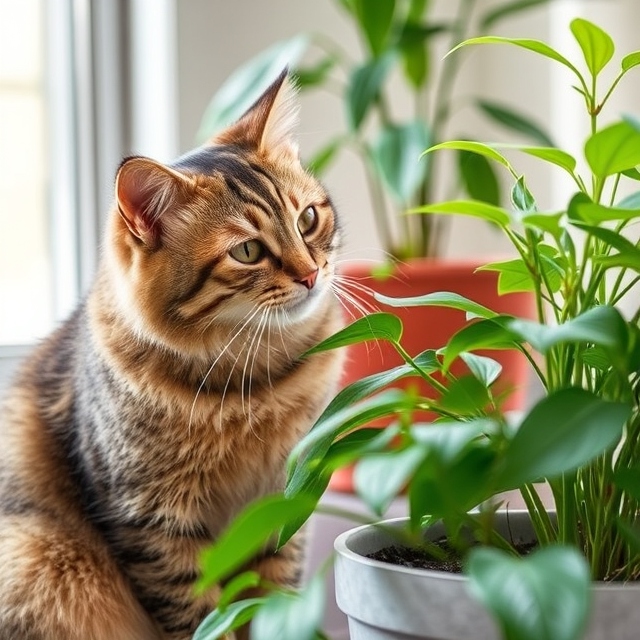Cats are curious creatures, and their natural instincts often lead them to explore their surroundings with their mouths. Unfortunately, this can sometimes result in them nibbling on houseplants, which can be harmful to their health.
This comprehensive guide will delve into the reasons behind this behavior and provide practical solutions to deter your feline friend from indulging in your leafy companions.

How to stop cats from eating houseplants
### Why Do Cats Eat Houseplants?
Understanding the motivations behind your cat’s plant-eating habits is crucial for finding effective solutions.
Here are some common reasons:
* Nutritional Deficiencies: While cats are obligate carnivores, they may occasionally crave certain nutrients found in plants.
* Boredom and Anxiety: Indoor cats, especially those lacking sufficient mental and physical stimulation, may resort to chewing on plants out of boredom or anxiety.
* Texture and Taste: Some cats simply enjoy the texture and taste of certain plants.
* Instinct: In the wild, cats may consume plants for medicinal purposes or to aid in digestion.
### The Dangers of Houseplants for Cats
Many common houseplants contain toxins that can be harmful or even fatal to cats.
Here are some examples:
* Lilies: All parts of lilies are highly toxic to cats, even small amounts can cause kidney failure.
* Sago Palm: This plant contains cycasin, a toxin that can cause liver failure and death.
* Tulips and Hyacinths: The bulbs of these plants contain toxins that can cause vomiting, diarrhea, and drooling.
* Dieffenbachia (Dumb Cane): This plant contains calcium oxalate crystals, which can cause oral irritation, swelling, and difficulty breathing.
### Effective Strategies to Stop Cats From Eating Houseplants
Fortunately, there are several strategies you can implement to protect your plants and your feline companion:
#### 1. Provide Cat-Safe Alternatives
Offer your cat a variety of cat-safe plants to nibble on. Some good options include:
* Catnip: A classic favorite that provides a stimulating and enjoyable experience.
* Cat Grass: A nutritious and digestible grass that can aid in digestion and provide essential nutrients.
* Spider Plant: A non-toxic and easy-to-care-for plant that cats often enjoy chewing on.
#### 2. Make Plants Inaccessible
* Elevate Plants: Place your plants on high shelves or hanging planters, out of your cat’s reach.
* Use Barriers: Create physical barriers around your plants using chicken wire, netting, or decorative fences.
* Place Plants in Rooms Cats Don’t Frequent: If possible, keep your plants in rooms that your cat doesn’t have access to.
#### 3. Deter Cats with Taste Aversion
* Citrus Scents: Cats generally dislike the smell of citrus. Place orange or lemon peels around your plants or use citrus-scented sprays.
* Cayenne Pepper: Sprinkle a small amount of cayenne pepper around the base of your plants. The spicy scent can deter cats from approaching.
* Commercial Repellents: There are various commercial cat repellents available that use bitter tastes or scents to discourage chewing.
#### 4. Address Underlying Issues
* Provide Enrichment: Ensure your cat has plenty of toys, scratching posts, and opportunities for play and exercise to reduce boredom and anxiety.
* Consider a Cat Tree: A tall cat tree can provide a stimulating environment and a safe place for your cat to climb and explore.
* Consult a Veterinarian: If your cat’s plant-eating behavior is excessive or persistent, consult your veterinarian to rule out any underlying medical conditions.
### Conclusion
Protecting your houseplants from your curious feline friend requires a multi-pronged approach. By understanding the reasons behind their behavior, providing safe alternatives, making plants inaccessible, using deterrents, and addressing any underlying issues, you can create a harmonious environment where both your plants and your cat can thrive.
Remember, patience and consistency are key. With a little effort, you can successfully deter your cat from nibbling on your beloved houseplants.


